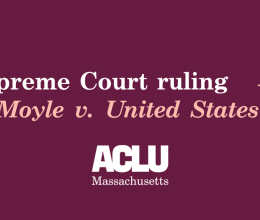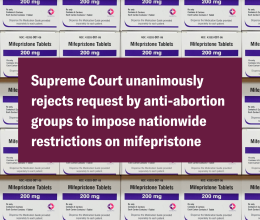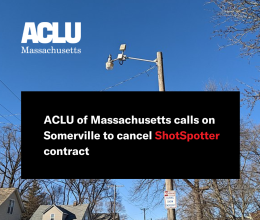
Location Shield Act would protect Massachusetts from predatory practice
A data broker company allegedly tracked people’s visits to nearly 600 Planned Parenthood locations across 48 states, including Massachusetts, and provided that data to inform one of the nation’s largest anti-abortion ad campaigns, according to new revelations from U.S. Senator Ron Wyden (D-Ore.).
In the aftermath of the Supreme Court’s decision overturning Roe v. Wade, cellphone location data puts people who seek or provide abortion care at risk of prosecution and harassment by hostile actors in other states, creating a vulnerability in Massachusetts’ post-Roe protections. Our cellphones keep track of where we go, every minute of every day, revealing the most sensitive and intimate things about us. Today, data brokers are allowed to buy this information and can sell it to anyone with a credit card.
Cellphone location data can also be sold to people seeking to cause harm such as domestic violence or stalking, bias-motivated violence or harassment, and threats to public safety officers or government security.
The Location Shield Act, sponsored by Representative Kate Lipper-Garabedian and Senator Cynthia Creem, would prohibit companies from engaging in the predatory practice of selling location data, while still allowing them to collect and process this data for legitimate purposes with user consent. According to an ACLU/Beacon Research poll, 92 percent (92%) of Massachusetts voters support this reform.
“This investigation shows that purchasing location data to target Planned Parenthood patients or providers is part of the anti-abortion playbook, not just in restrictive states but everywhere. We can prevent this happening in Massachusetts by passing the Location Shield Act. By stopping the sale of location data, we can safeguard the privacy and security of abortion providers and give patients greater confidence that their medical decisions will remain safely between them and their doctor,” said Nate Horwitz-Willis, Executive Director of the Planned Parenthood Advocacy Fund of Massachusetts.
“This latest report proves that Massachusetts is not immune from 21st century anti-abortion attacks—this data privacy crisis is right here in our backyard. If these extremists are able to use our location data to target abortion seekers with digital advertising, they can also use it to harass, threaten, or litigate against patients and providers in our state. Massachusetts has a responsibility to protect our location data and ensure that this personal information cannot be sold to hostile, out-of-state actors,” said Rebecca Hart Holder, president of Reproductive Equity Now.
“This aggressive anti-abortion campaign makes clear that digital privacy is essential to bodily autonomy. But the sale of cellphone location data puts all of us at risk: Every day, companies collect and sell sensitive location information from cellphones, revealing where people live, work, and socialize, and where our children go to school and play. Anyone can buy this data – anti-abortion and other violent extremists, foreign governments, stalkers, and more – and use it to harm us,” said Carol Rose, executive director of the ACLU of Massachusetts."
In June, the ACLU, Reproductive Equity Now, and Planned Parenthood launched “Your Location: It’s None of Their Business,” a campaign calling on lawmakers to ban the sale of cellphone location data. The campaign is supported by over 40 organizations, including AFL-CIO, Anti-Defamation League New England, Jane Doe Inc., TransHealth, and more. Last month, Massachusetts Attorney General Andrea Joy Campbell joined the call to ban the sale of cellphone location data in Massachusetts.







